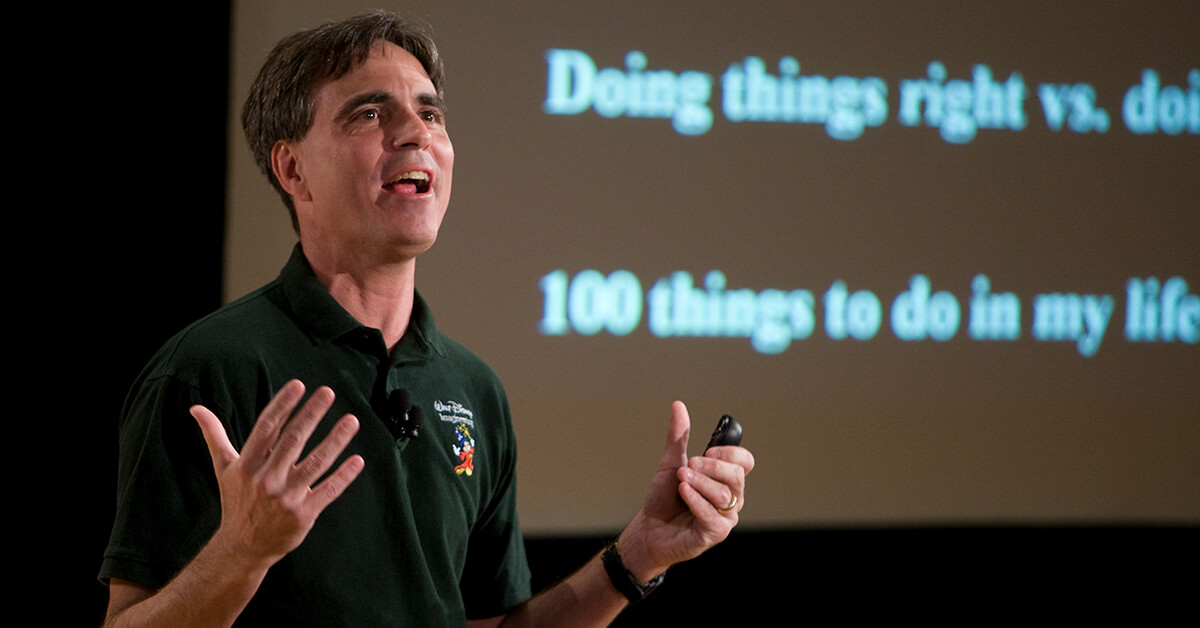Our CEO once recommended me Randy Pausch’s talk on Time Management and I was totally blown away by it. The part about methods of successful delegation is particularly interesting so I decided to summarize it in this article.

Photo credits: cs.virginia.edu |The University of Virginia’s School of Engineering hosted Randy for his lecture on “Time Management” on November 27, 2007.
If you’ve never heard about Randy Pausch, you’ll probably be surprised to know he had nothing to do with business, whatsoever. He was indeed a very successful man who inspired many people (he passed away in 2008), only he was not a typical manager or an entrepreneur, but a university professor.
Randy’s Story
In 2007, Randy Pausch was diagnosed with pancreatic cancer. He was only 47 years old when the doctors told him that he had three-to-six months to live, during which he’d have to undergo chemotherapy.
Somewhat unexpectedly, Randy continued working during those months, focusing less on his research, and more on his teaching. He wanted to share some of his insights on how to build a successful career and made them public in a series of lectures: “Really Achieving Your Childhood Dreams”, “Time Management” and “The Last Lecture”.
His talks became viral and reached millions of views, making Randy be remembered for far more than just the development of virtual reality.
“You can accomplish a lot more with help”
Despite the hype around “The Last Lecture”, Randy’s favorite talk was the one on “Time Management”. He mentions delegation as one of the most important tools one can use to achieve great results in life.
Randy underlines the fact that the term “delegation” is sometimes wrongly confused with “dumping the unwanted work”. In reality, people want to be empowered with challenging tasks; they want to take part in building something amazing. Hence, a manager’s job is to find such worthy projects and delegate them to team members.
Here are Randy’s insights on successful delegation:
1. Grant authority with responsibility
Most managers tend to delegate tasks, and not the authority to make decisions with regard to such tasks. If your team needs to come back to you for a budget decision, you’re not fully delegating the responsibility. Your message to the team is that you don’t trust them enough to do the work. As Randy put it: “You have to give them the whole package”.
2. Do the worst job yourself
Whatever it is, if it’s unpleasant and dull, do it yourself. It will make it very clear to your team that you’re still willing to get your hands dirty.
3. Treat your people well
People are your greatest resource. If you are fortunate enough to have the responsibility of managing a team, make sure you treat everyone with dignity and respect. Care about them and their professional development. And don’t forget about the staff and secretaries. Your life would be utter chaos without them.
4. Set concrete goals, deadlines, and consequences
When you assign a project, make sure you set a SMART goal and everyone has enough time, budget and resources to complete the tasks. Also, set the stage for what happens if the deadline isn’t met, or if the quality of the work doesn’t meet the expectations. Remember that the reward or penalty have to affect the ones responsible, not yourself.
5. Challenge people
No one is going to learn anything by staying in the comfort zone. You have to give them the opportunity to prove to you and themselves that they are capable of great things.
6. Communication must be clear
It’s so easy to disagree or misunderstand a task if there is no written record of the discussion. Randy’s advice is to send an email, but in our fast-paced digital world, it’s even better to use an instant communication tool. If you want to update the whole team, set up a Team Topic, send files and iterate them. That will help you align your team and focus more on the work itself, than on communicating about work.
7. Don’t focus on procedures, just set the goal right
Don’t teach people how to do their job. That’s why you hired them in the first place. Tell them what you want them to do and what to achieve. Let them surprise you with a way of solving a problem you would never have imagined.
8. Tell the relative importance of each task
Make sure everyone involved in the project understands what role they play in the overall picture and how important their task is.
Beware of upward delegation
One of the greatest obstacles in delegating right is the way you react to refusals.
What do you do when you want to hand out a task and people try to give it back to you: “But I can’t do this!” If trying to solve the other person’s problem is your first reaction, you’re already delegating wrong. Try to take a step back and let them at least try and find a solution. Reward the effort of trying and encourage them to look for more solutions.
This way you’ll create a healthy habit in your organization, which will eventually lead your team to outstanding results.
Comments are closed